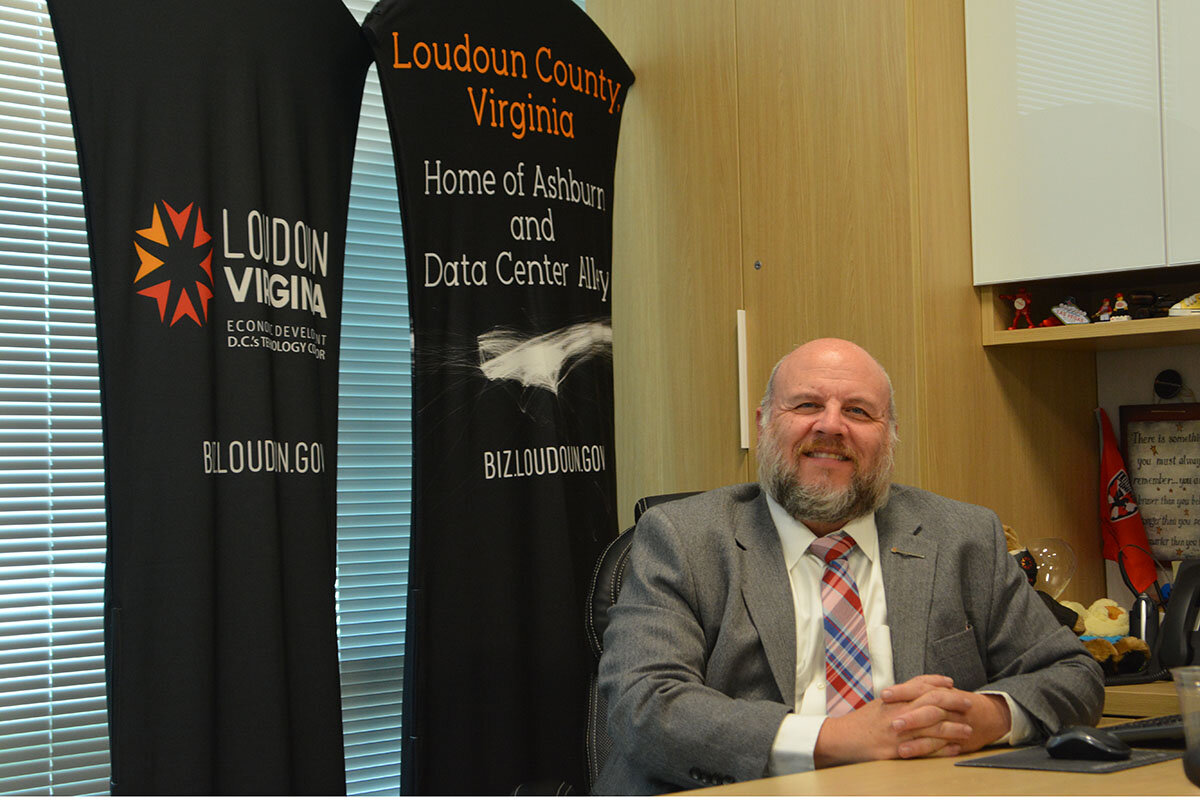How your cloud data ended up in one Virginia county
Loading...
| Ashburn, Va.
If you’ve ever wondered where “the cloud” is, that mythical-sounding repository for our collective mass of online data, you can stop your search here in the small Virginia city of Ashburn.
This town and surrounding Loudoun County are now home to the highest concentration of data centers anywhere in the United States. Computers in these box-shaped buildings here are likely storing chunks of your data – from text messages to photos and videos.
Why We Wrote This
As urban Americans go about their lives, the internet’s data-storage cloud goes with them. It’s everywhere. But actually it’s also somewhere very specific, if you hunt for the computers that make it happen.
What’s known here as Data Center Alley is no rival to Silicon Valley, but it reflects how the area around Washington, D.C., has become a tech hub in its own right. The roots here date back to the early origins of the internet.
Not everyone appreciates the data centers. “They’re destroying what was really nice about Loudoun County,” says local resident Susan Louis.
Still, their presence has meant 12,000 jobs and billions in tax revenue. “Twenty years ago, this was farmland; this was like driving to the moon,” says John Day, vice president of sales and leasing at Sabey Data Center. “Right now, it’s one of the wealthiest ZIP codes and wealthiest counties in the entire United States.”
If you’ve ever wondered where “the cloud” is, that mythical-sounding repository for our collective mass of online data, you can stop your search here in the small Virginia city of Ashburn.
This town and the surrounding former farm fields of Loudoun County are now home to the highest concentration of data centers anywhere in the United States. Computers in these box-shaped buildings here are likely storing chunks of your data – from text messages to photos and videos.
The internet is everywhere, but its data is here in Loudoun County (first syllable rhymes with “cloud,” second syllable with “done”). It’s no rival to Silicon Valley as a hub of innovation, but what’s known here as Data Center Alley symbolizes how, even for the widely dispersed global internet, businesses tend to locate in clusters. One data center begets another. In this case more than 100 in all, with roots dating back to the nearly forgotten firm Netscape, one of the internet’s early linchpins.
Why We Wrote This
As urban Americans go about their lives, the internet’s data-storage cloud goes with them. It’s everywhere. But actually it’s also somewhere very specific, if you hunt for the computers that make it happen.
With the pandemic spurring online activity, the cloud computing industry raked in $270 billion globally last year, with predicted growth of 23% this year, according to the research firm Gartner.
Being a tech hub can place a symbolic target on this region’s back. A supporter of a Texas-based militia group recently pleaded guilty to plotting to blow up an Amazon data center in Ashburn. And even when the warehoused computers are just chugging smoothly along, not everyone living in this county appreciates the changes brought on by Big Tech. Still, the spread of data centers has meant 12,000 jobs, billions in local tax revenue, and a boost for local income growth.
“Twenty years ago, this was farmland; this was like driving to the moon,” says John Day, vice president of sales and leasing at Sabey Data Center, during an interview in the company’s gated data center. “Right now, it’s one of the wealthiest ZIP codes and wealthiest counties in the entire United States.”
With per capita income surging past $55,000 in recent years, Loudoun County has been outpacing the state of Virginia and the nation economically. It retains its share of bucolic scenery, vineyards, and the farms that once were a “breadbasket of the Revolution” for the region’s role in feeding George Washington’s Continental Army. But its growth as part of the D.C. metro area has coincided with the rise of big data centers run by the likes of Amazon, Microsoft, and Google.
“They’re destroying what was really nice about Loudoun County,” says Susan Louis, a local resident for nearly 30 years, of the data centers, as she walks with her husband near a pond and vegetable garden next to Loudoun’s Farm Heritage Museum.
Why Loudoun County?
To understand the transformation, a brief primer on internet history is needed.
The idea behind the World Wide Web traces its roots to U.S. Department of Defense funding, and a key internet traffic “exchange point” called Metropolitan Area Exchange-East, which was located in northern Virginia.
In 1995, Netscape went public as a company that pioneered the concept of web “browsing” in the early days of the commercial internet. By the late 1990s, both the MAE-East infrastructure and America Online (acquirer of Netscape) were based in Loudoun County.
The exchange point coupled with available electric power, water, and fiber-optic connections made the Ashburn area an ideal location for data centers.
Mr. Day of Sabey Data Center calls the cloud simply “somebody else’s computer.” He explains a process in which information, such as a YouTube video, is stored in multiple locations around the world. A request for that information will procure the closest copy of that information from the cloud.
Behind the gates of the Sabey Data Center are gated racks of computer servers where information is held. No one here can access the information on the servers. The center just maintains the computers and the massive power supply and cooling mechanisms that they need. Multiple companies house their servers at Sabey.
The three major players in the U.S. cloud computing industry today – Amazon, Microsoft, and Google – have each invested billions in Loudoun. Amazon Web Services leads the way with about 65% of the U.S. market, according to a 2019 estimate by the research firm Gartner.
“They were here first and they’ve grown fast,” says Buddy Rizer, executive director of Loudoun County Economic Development since 2007.
Federal agencies are not required to report their cloud service provider, but Mr. Rizer calls the federal government the “world’s largest customer,” a major factor driving the industry’s growth.
There has not been a single day without data center construction in Loudoun County in over 13 years, the county’s development office says.
The dollar benefits are clear. Data centers have financed roads and other needs, while reducing the tax rate for a growing population. They’ll account for an estimated $500 million in local tax revenue this year alone.
Yet the companies here are also vying fiercely for marketplace power, not so coincidentally in the backyard of the federal government.
The cloud, in the fluffy imagery of its name, “obscures the fact that this is a hard-nosed business run primarily by a few giant tech companies,” wrote several cyber experts in an article on the national security blog Lawfare last year. Amazon Web Services, for instance, has been involved in a multiyear lawsuit disputing a $10 billion cloud computing contract the Defense Department awarded to Microsoft in 2019.
Big money and residual effects
Even as the companies have competed and brought money and jobs to Loudoun, area residents have not all been on board with the multiplying data centers.
“From the economic point of view, [data centers] may help Loudoun County,” says Patricia Larsen, “but they’re simply ugly and they keep popping up everywhere.”
Ms. Larsen, interviewed in Loudoun’s Claude Moore Park while she held her motorcycle helmet, lived in Loudoun County before moving to adjacent Fairfax County a few years ago.
“Any regular person, when they’re driving by, it’s like commercial after commercial after commercial building, and it’s just not appealing,” says Ms. Larsen, who noted one blue and yellow data center that looks like an Ikea store.
For Edwin Santamaria, a Loudoun County resident for about 24 years, it’s been “life as usual” with the increase of data centers in the county.
Not so for Chris and Susan Louis, both in real estate, who have had enough of the data centers. Loudoun residents for nearly 30 years, the couple are planning to move.
“We’re literally surrounded,” says Mrs. Louis, who attributed a low cicada-like hum to the data centers. She acknowledges the tax advantages for the county, but is disappointed that there are so many of the centers.
Mr. Rizer, seated in an office that overlooks a data center campus, says overseeing the development has been a “tremendous ride.”
“If the industry itself is in the second or third inning of growth, we, in Loudon County, are probably in the bottom of the eighth or top of the ninth,” says the former collegiate baseball player.
This county’s story is instructive. Mr. Rizer fields inquiries from other municipalities about how to become the next Data Center Alley. He predicts the industry is “going to continue to grow exponentially, nationally and internationally” with data centers being more dispersed geographically. He acknowledges the critiques about the look of some of Loudoun's early data centers, and says the county has “zero interest” in putting data centers in its more rural western section.
"It's really a new industry," he says, "so we're learning as we go along.”









